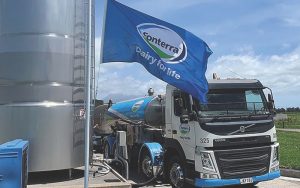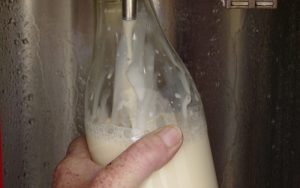
But what they are noticing even more now, is how quickly Christine Hilton and her contract milker Gavin Phimister are turning round the underperforming 225ha effective, 800-cow farm they run together.
“A lot of people have said how good it looks now compared to last year. There’s huge potential,” Phimister says of the farm, which is on a busy road that many locals use as an alternative route between Geraldine and Timaru.
Since she took over the farm two years ago, part of the settlement between her and her ex-husband when their 30-year marriage ended, Hilton has been on the steepest of learning curves and has endured quite a few setbacks.
Although she was born and raised on a farm and married a farmer, she hadn’t actively farmed before, largely because she developed an allergy to cows and had a full life raising four children and helping in the community and local church.
“It started off with just a bit of a skin rash and lots of sneezing but it was getting worse, affecting my breathing and I ended up passing out and was taken to hospital and I nearly died,” Hilton says.
Doctors couldn’t help, she says, other than prescribing medication for her breathing and advising her to stay away from cows.
“Before we had children, we decided I’d be a stay-at-home with them except for herd testing once the kids were older. I couldn’t even do that, so I was a pretty useless farmer’s wife in that part,” she laughs.
“Looking back, I wish I’d listened a lot more to things, even what my dad could have taught me about farming, but I probably just wasn’t interested.”
Although she hadn’t been involved in the farm management, she lives a busy life. She’s a long-serving volunteer ambulance officer, runs a wedding venue and made headlines by building a log house in Twizel, which is now a holiday rental. But taking on the dairy farm she and her former husband had wasn’t something she had anticipated.
“Farms weren’t selling a couple of years ago so I said, ‘I’ll take it over. If I can build a log house, even though I had never used a chainsaw, I can take over a farm’, and I have and it’s going to go well, but it’s not been an easy year or so,” she says.
The first season was difficult.
“I honestly didn’t know anything about farming so I was very vulnerable. People were kind and helpful giving advice but that can also be a confusing contradiction. You can have an agent, advisor or farmer with almost the same skillset, but they’ll give you opposite advice, it’s just trying to filter it,” she says.
Among the neighbours who could see Hilton was struggling on the farm was her ex-husband who, not wanting her or the farm to fail, gave their mutual friend and former employee Gavin Phimister a ring to see if he could help. His first job as a 15-year-old was working on their farm and he’d stayed there nine years before leaving for new career opportunities.

“We were contract milking at Mt Somers, a really good job with lovely people,” Phimister says.
“But our goal was always to build a house down here on a block of land we bought nine years ago. We have family in Geraldine and we wanted the kids to start high school in Geraldine.”
But while it suited to move back to Geraldine, the new job came with plenty of challenges, mainly getting production back up to where it needs to be.
“Gav took a hit coming here because he’ll make less money this year than he would have if he’d stayed where he was but it’s for the long-term, the end goal,” Hilton says, adding that the aim over coming years is for Phimister and his wife Rebecca to buy cows and move into a sharemilking role.
“I was so happy when Phimister agreed to come here,” she says.
“He’s been fantastic, his wife’s lovely and so are his boys. They’ve built a house just across the river, so I hope they’re here for 20 years and production’s just going to get better and better.”
Since Phimister arrived, the observant neighbours driving by have remarked the farm looks in better heart, something he attributes to management and attention to detail but he says the work is far from finished.
“Going forward, the goals are to improve per cow performance and we’re going to be quite aggressive with regrassing for the next few years. It hasn’t been happening so it needs to happen to make it viable,” he says.
He says the property isn’t the easiest farm in Canterbury to manage, as it’s long and thin and the heavy soils need to be carefully managed.
“It’s not a nice square Canterbury farm, it’s tricky. It’s very heavy and can get very wet and there’s a real fine balance of over-watering. When it’s wet you can see what’s happened in the past– damage gets done,” Phimister says.
One of the features that makes the farm tricky to manage is the irrigation system, which grew over the years as the farm was enlarged, extending what had originally been put in for cropping and drawing water from a variety of sources that have different consent conditions. But Phimister was working on the farm when much of it was put in so he understands its idiosyncrasies.
“The irrigation is quite complicated with water consents and water takes and what water goes where, so I’m probably lucky I understand it already,” he says.
“When I first started we were only milking 400 cows and had three irrigation guns and then as they bought more land and extended the irrigation system, I was part of that so I knew how it worked.”
He has got his head around the system but when he explains how it works, it’s clearly complicated.
“We’ve got 71 litres on a second from Kakahu Water (irrigation scheme) and then we’ve also got three more shallow river takes all measured on the Temuka River and there’s A and B rights with those with different trigger levels for restrictions,” he says.
“Some of them are measured on a 14-day average, so you can only use so much water over 14 days and some are annual take and litres per second. You’ve really got to watch what’s going on with the water and then everything can be hooked up so that the scheme water can water pretty much the whole dairy farm and the river water can as well, so if we went on restrictions with river water, we can use the scheme water to water the farm.”
Hilton is grateful for Phimister’s intimate knowledge of the system.
“Gav spends a lot of time watching the weather and there are those days where it’s, ‘Do I irrigate or not, or actually is rain coming and it would ruin the farm?’, so he’s been really on to it,” she says.
“Whereas another person would just think we need to irrigate and keep going, Gav would be watching the weather and realising how vulnerable the heavy soils are.”

Phimister doesn’t much like to talk about production because it’s well below average for Canterbury and will take time to turn around as the farm is regrassed, unproductive cows are culled and he gets new systems in place. But early signs are promising, despite a season where most farms in Canterbury are down on production because lack of sunshine has meant pastures are lacking in metabolic energy (ME).
“Even with the season we’ve had with the way things have gone, we’re milking less cows but ahead of last year’s production. It should be the other way, we should be behind it, so not blowing my own trumpet, that’s just management of the farm and it’s only going to get better,” he says.
He’s running a System 3 supplementing grass with palm kernel and silage. The palm kernel is fed in-shed, with added lime flour and causmag, a way to get minerals into the cows. The stock water system can’t be used for that because it’s connected to the irrigation network and if minerals were injected that way, they’d be wasted in the irrigation water.
Between 500gm and 3kg is fed to each cow and that’s supplemented by silage in shoulders of the season, some made on the milking platform but most bought in.
The herd is wintered off-farm. The in-calf heifers are fed kale on a nearby lease block and will come back to the farm on June 1 and be wintered there.
Hilton says that while Phimister’s official title is contract milker, he goes far beyond that.
“He’s involved in setting budgets, helps me get quotes for everything and he actually comes up with plans and then sells them to me – what development is needed, what cows to cull etc – whereas a lot of contract milkers don’t have that responsibility. And our long-term goal is that he’ll buy cows off me and we’ll sharemilk,” she says.
“I’d like to say we complement each other,” he says.
“We’ve got a trusting relationship, I’m not trying to pull the wool over her eyes.”
“I have full confidence that he has the best at heart for this farm and for both of us because if I’m making money, he’s making money, so he’s only going to want to make the best financial and operational decisions,” she adds.
One thing Phimister has had to get used to is Hilton’s penchant for painting things bright pink, be it farm machinery or fence posts. She says she’s always loved pink and really started to embrace it when she became a volunteer ambulance officer.
“My gloves are pink, my stethoscope and scissors are pink, I used to have my hair tied up with a pink flower and even at two o’clock in the morning when I go to a big car crash or something, I’ve still got my pink on and hopefully it brings cheer to somebody,” she says.

Hilton’s had to pull back from that role as managing the farm business and her wedding venue as well, as keeping in touch with her four grown up children and six grandchildren has taken over, but intends to fit in more volunteering when she can in winter.
Meanwhile on the farm, the pink paint is spreading and even her John Deere tractor has a pink tinge.
“We needed a new tractor so all the different agents came knocking on the door and they were like, ‘What do you want in a tractor?’ I would say cupholders,” Hilton laughs.
“I don’t know about tractors and sadly my dad passed away nearly four years ago. He was a great arable farmer near Pleasant Point and I missed him terribly because he could have helped me.
“In the end one guy said to me, ‘So what do I need to do to get this sale?’, and I said, ‘Well I just need it pink’. He said we’ll put a pink sticker on it and I said, ‘No, it’s actually got to be pink’, and I got my lipstick and put it on a bit of paper and said, ‘It’s got to be that pink, it can’t be a yucky pink’, so off he went and John Deere agreed to get the right colour and paint the wheels pink’.”
Other machinery, including irrigators and a heavy roller are pink now too.
“It doesn’t hurt anybody, it just puts a smile on people’s face and whether they think I’m weird or think it’s cool, I don’t actually care, it just spreads a smile.”
Phimister’s getting used to the new colour scheme too.
“It’s just different. It’s not what you expect to see on a dairy farm. I’m so used to it and I think, ‘What are they looking at?’ Oh, that’s right, I’m in a pink vehicle,” he says.
“I remember our neighbour down the road rang me and said, ‘Can I borrow your heavy roller?’, and I said, ‘Help yourself’. When he turned up it had gone pink since he last saw it and he was like, ‘No thank you, I’m not dragging that down the road’, though he has borrowed it since.”
Though she’d never really been an “on-the-tools” type, that changed for Hilton when she developed a love of log houses and decided she wanted one of her own.

“I got the opportunity to go to Kaikoura after the earthquakes and I visited a couple who were living in a log house. When the earthquake happened about midnight they were asleep and their bed broke in half and every door, window, just everything, smashed and the logs just stayed absolutely solid and that just got me thinking. They said, ‘If we hadn’t been in this log house we’d have been dead’, and I believe them,” she said.
She also met local fire chief Graeme Mould through emergency services work and he also owned Natural Log Homes. Hilton signed up for one of his annual courses so she could build a log house on a 1ha, Douglas fir-covered site she’d bought in Twizel.
“They worked on my house which made it a bit cheaper for me. I had a lesson with my new pink-painted chainsaw the week before on a heap of fire wood and then I was into chain sawing and building for real. It was a good workout,” she says.
The completed log house is now a holiday home, rented out through Airbnb.
Hilton also has another on-farm business, a wedding venue in a 250 square metre marquee on the lawn near her home. Hiltonview was launched on something of a whim when she realised how expensive it would be to hire a marquee for one of her son’s wedding.
“I love Alibaba (.com) in China – I’m really good with buy-now – and I was like, ‘It’s not too much difference to actually buying one,’ so I got it,” she says.
Then came the expense of trenching out power and water, building toilets and getting resource consent, but she soon had all the boxes ticked and a new business was born.
“It’s beautiful, absolutely stunning and it’s a full business. I very much pick the couples I want here because it’s still my private home. It’s an asset to South Canterbury and I also enjoy hosting funerals and memorials. I didn’t think that would be the direction it went in,” she says.
Though Phimister’s not involved in the wedding business, he does have to bear it in mind when he’s making farm management decisions.
“You can’t have cows in the next paddock when you’ve got a wedding going on and I’ve got a honeymoon suite, so you can’t have cows coming up the race in the morning when they’re meant to be having their honeymoon,” Hilton laughs.
It’s early days in Phimister and Hilton’s partnership but step-by-step they are turning the farm around, building production and they’re confident they’ll soon be making a profit too.

“I’m a different girl sitting at the table now than I was at the start of last season,” she says.
“The first meeting with the bank was four bankers. I gave them coffee and I took them for a train ride round my garden which kinda doesn’t cut it, but ASB has been very good to me.
“I have a lot of debt and they took a bit of a risk taking me on. It was just the most massive learning curve for me, having to face the banks and do budgets, understand consents, pastures, animal health, water and effluent. I was never part of any of that before and I had to make it work.”
“I guess with the journey last year what I’ve learnt is what’s important to me.
“Gav’s important to me, having healthy stock that are well-fed – it’s huge just seeing them all out there happy. If they’re happy, he’s happy and I’m happy. My whole outlook is completely different because even though I did own it, I’ve never felt like I feel now and when I’m driving down the road it is a completely different thing.
“I’m excited about the future and have big goals, including a touch more pink.”
Farm facts:
Owner: Christine Hilton
Contract milkers: Gavin and Rebecca Phimister
Location: Geraldine, Canterbury
Farm size: 225ha effective
Cows: 800

























